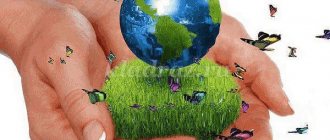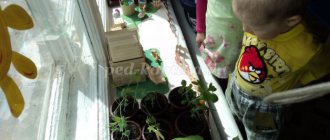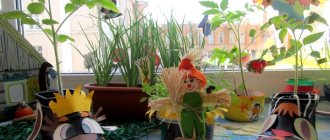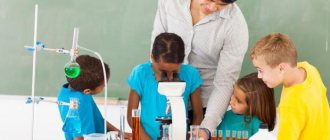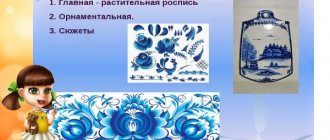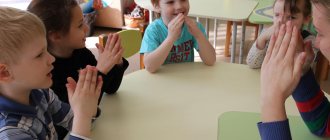Project “Family Traditions” in the preparatory group of kindergarten
Project “Family Traditions” in the preparatory group of a preschool educational institution
Author: Leontyeva Anna Vladimirovna, teacher of the preschool educational institution “Kindergarten 233”, Yaroslavl. Description of material: this project was developed for preschoolers in the preparatory group. The material will be of interest to teachers, educators and parents. The project is designed for 2 weeks. Can be used in preparation for the lexical topics “Traditions” and “Family”. “Family traditions... They contain the wisdom of our ancestors. Family traditions... They have the stamp of time. Family Traditions – A Wonderful Heritage. We will bequeath it to our children” I. Nekrasova Abstract: Family is the closest and dearest people who surround us. They give us their warmth and care. A family is like a small state that has its own laws and traditions. It is family traditions that make it stronger and more friendly, and unite its members among themselves. The integrity of the family and its spirituality are based on traditions. Thanks to family traditions, our home becomes cozy and hospitable. The “Family Traditions” project is aimed at solving the problem of children’s insufficient knowledge of family values. The relevance of the topic is that raising a child begins with the family. Children should know family traditions, adopt them and pass them on from generation to generation. Traditions can be very different:
joint events, memorable surprises and gifts, family recipes, a bedtime story told by mom, and many other little things. Although, in fact, these are not trifles at all. Thanks to knowledge about family values and customs, warm relations between different generations are maintained. The family maintains a sense of stability and peace. Acquaintance with family traditions should begin with a generalization of children's knowledge about the traditions of their people (folk holidays, folk toys, folk songs) and knowledge about their family.
The goal of the project: to develop interest in one’s family, the history of one’s family, and preserve family traditions. Project objectives: to form ideas about family and family relationships; Develop an interest in your family, the history of your family, and the preservation of family traditions; Create conditions for teamwork between group teachers, students and parents on issues of family values, using traditional family dishes as an example. Project type: informational, practice-oriented. Project duration: 2 weeks. Expected results: all project participants will acquire knowledge about the traditions and customs of their family. Children will expand their knowledge of the traditions of the Russian people, traditional toys, folk dances, and holidays. Get an idea of the family tree. Parents and children will take part in compiling the “Traditional Family Dishes” album. They will acquire knowledge about the importance and need to honor what is passed down to us from generation to generation. Teachers will be able to expand their knowledge and understanding of the history of their people, and will receive information about the families of their students, their traditions and customs. Products of the project: 1. Compilation of a card index: “Russian folk games for children”; 2. Compiling a card index “My Family” - eye gymnastics, breathing exercises, psycho-gymnastics, physical education, finger gymnastics, riddles, poems about family; 3. Selection of tales about family; 4. Drawing “My Family”; 5. Application using the cutting technique “My Family’s House”; 6. Modeling “My family’s birthday”; 7. Album “Traditional family dishes”. Project implementation stages: Stage 1. Preparatory: study of scientific and methodological literature on the topic “Family”, “Traditions of the Russian people”, organization of work with parents in preschool settings. Studying Internet resources on the topic of the project. Selection of fiction for use in working with children as part of the project: fairy tales, poems about family, proverbs. Stage 2. Project implementation: conversations with children on the topics of the week: “Folk holidays and traditions”, “My home. My family", "Pedigree of my family". Stage 3. Final: obtaining the products of the project implementation. Plan of activities: Cognitive development:
conversations with children about Russian traditions, folk holidays and festivities, Russian folk toys;
Conversations about family, family tree. Speech development:
compiling a story about your family according to the “Genealogical Tree of My Family” scheme;
Social and communicative development:
Didactic games “Name it kindly”, “Complete the sentence”;
“A Ball of Magic Words”; "A piggy bank of good deeds." Artistic and aesthetic development
• Drawing “My Family”;
• Application using the cutting technique “Home for my family”; • Modeling “My Family’s Birthday” Reading fiction: • Fairy tale “Stupid gentleman”; • Fairy tale “The Magic Family” by I.L. Gamazkova; • Fairy tale “Nestling” (From the book “Methodology of Fairytale Therapy”, author V.M. Sertakova) Conclusions: During the project activities, teachers, together with children and parents, came to a consensus: traditions strengthen the family, make it cohesive and united.
Promote interaction and strengthen family ties. Download the Card Index on the topic “My Family”
Presentation on the topic: Family traditions
We recommend watching:
Project in the senior group of a kindergarten Project in the senior group on the topic “Trees and shrubs in spring” Practice-oriented project for landscaping the territory of a kindergarten Educational project. Second junior group
Similar articles:
Educational and creative project on the theme “Golden Autumn”. Junior group
Project for children of the senior group “Our cheerful garden”
MAGAZINE Preschooler.RF
Project in the middle group “My family and family traditions”Authors: teachers of MBDOU "DS No. 6" of the Starominsky district municipality Voloshina S.L., Glushko E.F.
Family is a great kingdom of love. It contains faith, righteousness and strength. The family is the support of the state, my Country, my Russia.
Project type: information-practice-oriented
Project participants: middle group students; group teachers; parents of pupils; Children's age: children 4 -5 years old
Project duration: short-term (6 weeks)
Relevance and significance
In the modern educational process, it is not unimportant to instill in the younger generation patriotic feelings of love and respect for family and friends. Family is a source of love, respect, solidarity and affection, something on which any civilized society is built, without which a person cannot exist.
Working in the context of the implementation of the Federal State Educational Standard requires the integration of family education and preschool education, changing the style and forms of interaction between the preschool institution and the family, which will ultimately contribute to the development of general principles in the work on the development of the personality of a preschooler, the formation of a common educational space for a preschool child.
The feeling of love for the Motherland originates in the family. And for a child, a family is a world in which the foundations of morality and relationships with people are laid.
Observing the children in our group, we saw that children need the affectionate touch of adults, i.e. they need emotional and tactile contact. Sometimes they put off playing to come up and snuggle up to the teacher. Parents, picking up their children, are constantly rushing them, in a hurry. Some tension arises, which develops into the whims of children and irritability of adults
The survey showed that in our group there are many young families who do not have their own traditions. They consider it unnecessary, not relevant. As a result, children do not receive enough emotional contact and understanding in the family.
A contradiction arises: on the one hand, the importance of family traditions in raising children is recognized by psychologists, and on the other hand, in our time, many families and relatives have lost contact with each other, there are no family traditions, therefore, modern parents do not see the importance of the influence of family traditions on the development of the child.
This contradiction allows us to formulate a research hypothesis: if the necessary conditions are created for children to become familiar with their surname, first name and patronymic of their parents, their clan and pedigree, with family traditions, based on the interaction of children and parents, then this will not only unite the family, but will also have positive impact on the development of spiritual and moral qualities of middle-aged children. In order to study the family, establish contact with its members, and coordinate educational influences on the child, the idea came up to create a project “My Family and Family Traditions ,” which will help children understand the importance of family, instill in children love and respect for its members, and instill a sense of attachment to family and home. We, adults, teachers and parents, must help children understand the importance of family, cultivate in children love and respect for family members, and instill a sense of attachment to family and home.
Expected result:
We assume that as a result of the implementation of this project, all its participants - children, teachers, parents - will acquire certain knowledge.
Children will know:
- your family's past;
- professions of their parents and grandparents;
- the meaning of your last name;
- will be able to state their full name and patronymic;
- will be able to compose a story about their family members, pedigree;
- will be well versed in the family tree of their family;
- replenish vocabulary (genus, pedigree, traditions);
Parents:
- will acquire knowledge about family and folk traditions, holidays;
- strengthen inter-family and intra-family ties;
- a sense of pride in your family will be developed;
- will treat their ancestors with respect;
- learn to organize family holidays;
Teachers:
- expand knowledge about national holidays and their origins;
- develop lesson plans, conversations for children, consultations for parents;
- will replenish the attributes for role-playing games;
- will know better the families of their students, their way of life, traditions, which will contribute to close cooperation;
- will be respectful and interested in family traditions.
Project activity product:
- exhibition of family works “My Family Tree” .
- culinary album of traditional family dishes: “Mom’s Delicacies” .
- showing the presentation of the project “My Family and Family Traditions” at the pedagogical council, parent meeting.
Project object: the process of personality formation in preschoolers.
Subject of the project: family traditions as a means of shaping the personality of preschoolers.
Objective of the project:
- “family” in children ; carry out interaction between preschool educational institutions and families through familiarization with folk and family traditions
- create conditions for the accumulation of experience in intellectual and creative activity through independent research.
Tasks:
- Give an idea of the concepts: “clan” , “parents” , “pedigree” , “relatives” , “family” , “relatives” .
- To form in children an idea of the family, of a moral attitude towards family traditions, to expand knowledge about their immediate environment, to teach them to understand family ties.
- Continue to develop cognitive abilities in children, actively include them in creative and exploratory activities.
- Broaden their horizons and enrich children’s vocabulary with terms of family relationships, develop coherent speech.
- To instill in children love and respect for family members, to show the value of family for every person and to show care for loved ones.
- Improve the quality of family-kindergarten .
Contents of the project.
Stage 1: Preparatory
- Draw up a long-term project plan.
- Survey of children on this topic.
- Create a developmental environment: select materials, toys, attributes for gaming and theatrical activities.
- Select didactic games.
- Select illustrated material.
- Select fiction on the topic “Family” .
- Select material for productive activities.
- Joint production of parents and children of attributes for role-playing games: “Family” , “Hospital” , “Shop” .
- Questioning parents on the topic: “Family traditions, holidays, hobbies .
Stage 2: Basic
- Conversations: “Why does a person need a family?” , “Who do I want to be like?” , “Why I love my mother” , “Family holidays” , “A day off in my family” , “Why a person is given a name” (introduction to the birth certificate).
- Problem situations: “What will you do if mom gets sick / dad leaves?” , “A button on the doll’s dress came off, who can help?” , . ”
- Situational game educational activity “My Family” .
- Didactic games: “Say kindly” , “Find your mother” , “Whose mother?” , “Place them in order” (pictures of people, taking into account age-related changes).
- Role-playing games: “Shop” , “Hospital” , “Holiday in the House” , “Mothers and Daughters” , “Family” , “Birthday” .
- Reading fiction on the topic “Family” :
E. Blaginina “Let's Sit in Silence” , L. Tolstoy “Grandmother and Granddaughter” , V. Kataev “Flower - Seven Flowers” , S. Marshak “The Tale of a Smart Mouse” , “Grandfather and Granddaughter” , p. n. With. “Geese-swans” , B. Emelyanov “Mother’s hands” , Nenets folk tale “Cuckoo” . Introduction to proverbs and sayings about family.
- Finger gymnastics: “My family” , “Who lives in our apartment” , “Mom’s helpers” .
- Artistic and aesthetic activities:
Drawing: “Let’s help mom wash the handkerchiefs” , “My dear mom” ,
"My family"
Application: “Granny baked a bun” , “Flowers for mom” .
Construction "My home is my fortress" .
- Watching cartoons: “Mom for a baby mammoth” , “Little Raccoon” , “Seven-flowered flower” .
- Dramatization: “The Cockerel and the Bean Seed” , “The Tale of the Stupid Mouse” , “Geese and Swans” .
- Listening to audio recordings and songs about mom, dad, grandfather and grandmother.
- Collective work: “We are helpers .
- Excursion to the mini museum of the preschool educational institution “Cossack Hut” .
- Entertainment “My mom is the best in the world .
- Compiling the album “What do our surnames mean? ”
- Didactic game with parents “Basket of good deeds” , “Assemble a portrait from parts” .
- Consultations for parents: “Family and family values!” , “The influence of family on child development”
- Recommendations for parents (booklet) “Traditions: create and pass on!” , booklet “How to spend your weekend”
- Memo for parents “Tell your children more often...” .
Stage 3: Final
- Wall newspaper on the topic: “My Family” .
- Presentation of the project “My Family” .
- "Open Day".
- Leisure “Me and my family” .
- Parents' meeting "Moral education in the family" .
- Exhibition of family works “My Family Tree” .
- Culinary album of traditional family dishes “Mom’s Delicacies” .
Expected and obtained results:
The peculiarity of our project was that together with our family we not only learned, mastered new things, worked, but also worked in one team “Teachers-Children-Parents”, where parents became active participants in the lives of children in kindergarten.
Thus, we think that the direction we have chosen is promising, that moral and patriotic education should begin with the birth of a child in every family, with familiarization with traditions.
When working with children, a problem emerged. A survey among children showed that children do not know enough about their family, where and who their parents work, what the names of their grandparents, great-grandparents are. To change this situation, the idea came up to create the “My Family” , i.e. to study the family, clarify the educational needs of parents, establish contact with its members, and coordinate educational influences on the child.
Thus, as a result of project activities, children generalized and systematized their knowledge about the family. During the implementation of the “My Family” , the level of children’s knowledge about family has increased significantly. Children learned more about their family, family members, traditions, and the life of their grandparents. Thanks to this project, parent-child relationships have been strengthened, children's horizons have expanded and their vocabulary has been enriched, and new family traditions have emerged in most families.
| Next > |
